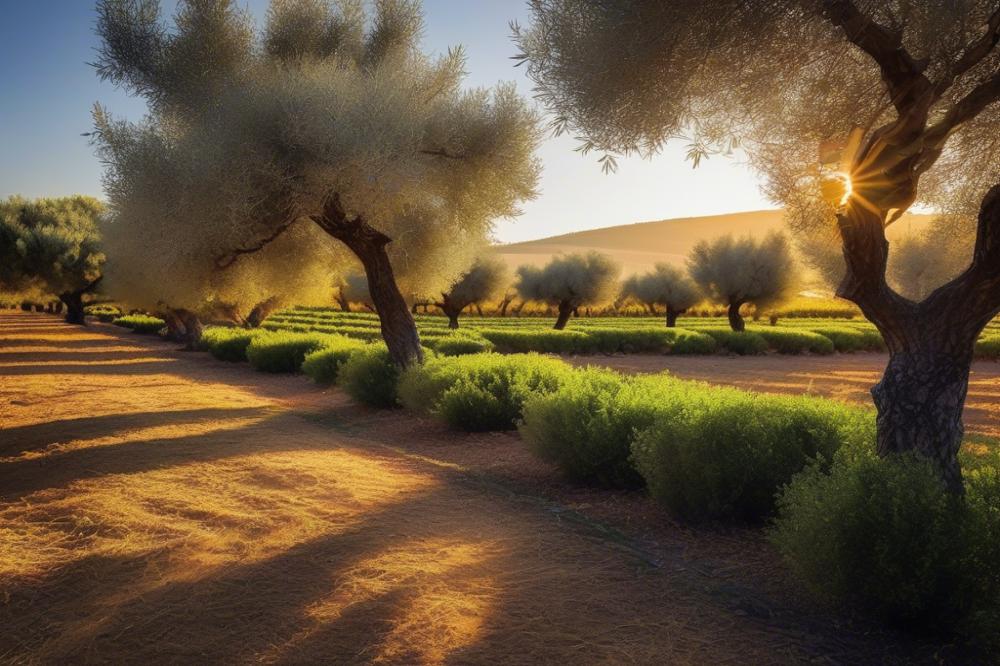The History and symbolism of olive cultivation
Olives have been grown for thousands of years, primarily in the Mediterranean region. Cultivation of this fruit is not just about food; it carries deep cultural significance. Ancient Greece cherished olives, linking them to profound symbolism. They represented peace and prosperity, and even adorned the heads of victors in athletic competitions. The history of olives reflects humanity’s intricate relationship with nature.
This fruit is not merely a staple of Mediterranean agriculture. Its oil has become vital for cooking, health, and trade. Beyond the kitchen, olive oil boasts numerous health benefits, such as promoting heart health and providing antioxidants. It has firmly established itself as a key element of the Mediterranean diet, which is famous for its nutritional advantages.
In addition to its health roles, olive cultivation plays a crucial part in promoting biodiversity and sustainable farming practices. Growing olives supports various ecosystems and encourages the coexistence of numerous species. Farmers who focus on these practices contribute to the land’s health and resilience.
The olive tree symbolizes peace, making it an enduring emblem across cultures. Its resilience allows it to thrive in challenging environments, further enhancing its representation of hope. In recent years, the global interest in olives has grown, highlighting their importance not only in cuisine but also in traditions and community values. From ancient rituals to modern health discussions, this fruit remains a powerful force in our collective narrative.
The Origins of Olive Cultivation

The story of olive cultivation dates back thousands of years. This ancient tree has roots tracing back to around 6000 BCE in what is now Turkey. From there, it spread into the Mediterranean region, where it became essential to many cultures.
In ancient Greece, olives were more than a food source. They symbolized peace and prosperity. Greeks used olive branches as a sign of victory, especially during the Olympic Games. The healthy oil produced from olives was considered a gift from the gods, prized for its versatility in cooking and medicinal uses.
As civilizations grew, so did the significance of olives. The Romans cultivated vast groves of olive trees, creating a thriving trade in olive oil. This golden liquid became a staple in Mediterranean diets. It provided health benefits, making it a favorite among those who understood nutrition. Olive oil contributed to the development of agriculture in the region, influencing farming methods for centuries.
Biodiversity thrived along the coasts of the Mediterranean as olive trees flourished. They adapted well to various climates and soils. Farmers practicing sustainable farming techniques helped preserve numerous olive varieties. This practice not only maintained genetic diversity but also contributed to resilient ecosystems.
Today, the legacy of olive cultivation continues. Modern approaches combine ancient wisdom and science. Farmers around the world still value olives for their cultural significance and health benefits. As interest in organic and sustainable foods grows, olive trees remain at the forefront of agriculture.
Cultural Significance of Olive Trees

The olive tree carries a rich symbolism across various cultures. In many parts of the Mediterranean, it represents peace and prosperity. This connection to peace is particularly profound in ancient Greece. The olive branch became a powerful sign of truce between warring states. It was often delivered by messengers to signify the end of hostilities.
Health benefits also play a role in the cultural significance of olives. Many societies view the consumption of olive oil as essential for good health. This oil is not just a staple in Mediterranean cuisine; it has become a symbol of longevity. Festivals celebrating olive harvests often emphasize these health aspects while honoring traditions that date back thousands of years.
In literature and mythology, olive trees feature prominently. Figures from Greek mythology, such as Athena, are linked to this tree. According to legend, Athena gifted the olive tree to Athens, ensuring its prosperity. Throughout history, poets and writers have drawn on the imagery of olives to convey messages of hope and renewal.
Various festivals celebrate the harvest of olives. These events often include rituals that reflect both gratitude and joy. Families gather to partake in the harvest, promoting community bonding. Sustainable farming practices are frequently highlighted during these gatherings. Biodiversity is essential, and many modern agricultural methods embrace this idea.
Olive branches have appeared in religious contexts as well. In Christianity, for example, they symbolize peace and reconciliation. This strong association continues to resonate with people today. Agricultural practices surrounding olive cultivation are often steeped in tradition. Many growers maintain ancestral techniques, preserving the unique character of each grove. Through these age-old customs, the olive tree remains a living testament to human connection to the earth.
Economic Importance and Health Benefits of Olive Cultivation

Olive oil production plays a vital role in the economies of Mediterranean countries. Regions like Italy, Greece, and Spain depend heavily on this lucrative industry. The rich history of olive farming dates back to ancient Greece, where the tree was recognized for its symbolic value and its agricultural importance. Today, olive oil is not just a culinary staple; it is a key export that sustains livelihoods and promotes local economies.
Health benefits associated with olives and their oil are impressive. Research highlights the positive effects on heart health due to the high levels of monounsaturated fats. Regular consumption of olive oil is linked to lower cholesterol levels and reduced risk of heart disease. Additionally, olives contain antioxidants and anti-inflammatory properties, making them beneficial for overall wellness.
Cultural Significance and Biodiversity
Beyond economic aspects, olive cultivation carries deep cultural significance in many societies. The olive branch is a well-known symbol of peace, recognized across various cultures. It embodies harmony and coexistence. Olive trees also contribute to biodiversity. They create habitats for numerous species, promoting ecological balance in agricultural settings.
Sustainable farming practices in olive agriculture are increasingly important. Many growers are adopting methods that conserve water and protect the soil. These practices not only enhance yield but also minimize environmental impact. Organic olive oil production, for instance, often avoids harsh chemicals, promoting healthier ecosystems. As consumer demand for sustainability rises, these farming techniques are becoming standard in the industry.
In conclusion, the economic significance of olive oil production is undeniable. Additionally, the health benefits and cultural symbolism associated with olives continue to resonate through centuries. Olive cultivation, as an agricultural practice, remains integral to sustaining Mediterranean traditions and promoting ecological health.
Biodiversity and Sustainable Farming Practices
Olive farming plays a key role in promoting biodiversity across Mediterranean landscapes. This type of agriculture supports various plant and animal species. Ancient Greece revered the olive tree not just for its fruit but also for what it represented. It was a symbol of peace, wisdom, and prosperity. Sustainable farming techniques are vital for maintaining this biodiversity amidst changing environmental conditions.
Farmers today often adopt organic practices to reduce chemical usage. Crop rotation and cover cropping are methods used to enhance soil health. These techniques can lower the impact on local ecosystems. Consequently, wildlife habitats can thrive. Biodiversity contributes to a balanced ecosystem, ultimately benefiting the landowners as well.
Many olive growers commit to environmental conservation, focusing on water management and soil preservation. Efforts such as rainwater harvesting and planting native species help maintain local flora and fauna. These practices resonate with the cultural significance of the olive tree in various societies. They are not just about producing olive oil; they are about nurturing the land for future generations.
However, challenges persist for olive farmers. Climate change is becoming a pressing issue, pushing new pests and diseases into traditional growing areas. These threats demand ongoing research and adaptation. Farmers must also navigate market pressures and changing consumer preferences. Health benefits linked to olive oil can boost its popularity, but competition is fierce.
As the landscape of agriculture continues to evolve, olive farming remains a crucial part of Mediterranean life. Its impact on biodiversity and the way it intersects with sustainable practices offer hope. Recognizing the value of this cultivation can lead to beneficial changes for the environment and society.
Wrapping Up the Rich History and Future of Olive Trees
The cultivation of olives has a storied past, deeply intertwined with human civilization. Ancient cultures celebrated the olive tree as a source of food, oil, and even beauty. Over centuries, this humble plant has become a symbol of peace and victory in various societies. The Mediterranean, in particular, has witnessed the flourishing of olive groves, shaping the landscape and culture of its people.
A unique aspect of olive cultivation is its profound symbolism. It represents resilience and endurance, thriving in environments where few other crops can. This adaptability speaks volumes about the importance of olives in agriculture. They provide nourishment and contribute to the economy in many regions, particularly in Southern Europe and parts of the Middle East.
Looking to the future, olive farming faces both challenges and opportunities. Concerns about climate change and land degradation compel farmers to rethink traditional practices. Emphasizing sustainability may hold the key to preserving these ancient trees. Methods that respect the environment and promote biodiversity are becoming increasingly important. Adopting organic farming and integrating modern technology could enhance production while protecting natural resources.
Health benefits associated with olive oil continue to gain recognition globally. Its role in promoting heart health and reducing inflammation makes olives an essential part of many diets. This factor elevates the importance of olive cultivation in a world that increasingly values nutritious food.
In summary, the olive tree stands as a testament to human history and cultural significance. It symbolizes peace and prosperity, binding communities across time and space. By facing future challenges with innovation and care, we can secure the legacy of olive cultivation for generations to come. Through our respect for nature, we can continue to enjoy the richness that these trees provide and uphold their importance in both our diets and culture.



